If you’re wondering whether blog posts actually help SEO, the overwhelming answer is yes!
Blog posts are a great way to improve your organic visibility and start increasing the number of organic clicks you get from Google.
But blog SEO doesn’t happen overnight and takes knowledge of both high-quality content writing and SEO strategies.
So here’s a complete guide on how blog posts can help SEO, and how you can get started using blog posts to increase visitors to your website.
What is Blog SEO?
Blog SEO is the process of using blog content to earn keyword rankings and organic traffic. It requires content that is well-written, helpful, relevant to the topic, and displays the on-page and off-site signals that Google looks for when ranking web pages.
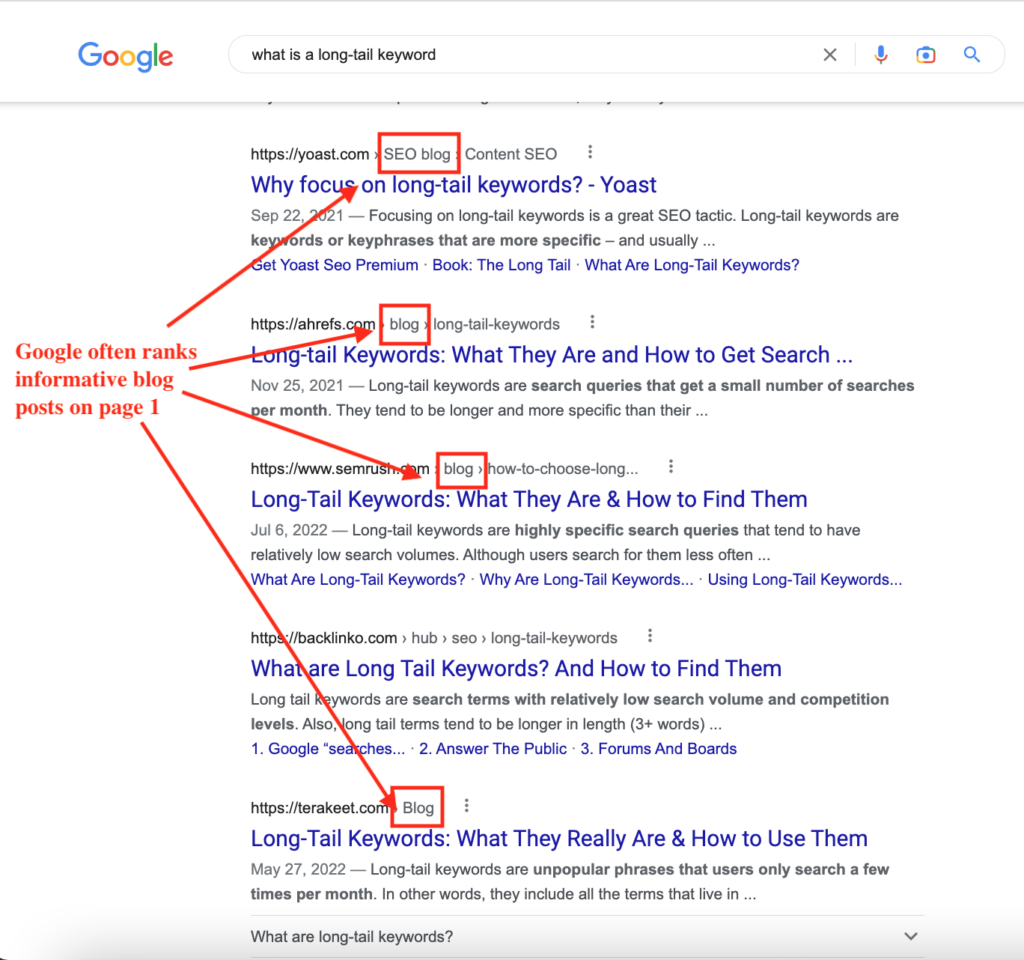
Websites that embrace blog SEO can see benefits to their search engine visibility and all other areas of their content marketing strategy.
Blogs do help SEO, and investing in a blog strategy is well worth the effort.
How Exactly Do Blog Posts Help SEO?
Well, good blog posts tend to display all of the quality indicators that search engine crawlers look for.
That’s why websites that have a lot of optimized blog content often earn many of their website visitors from organic search.
Here are some reasons why blog posts are so great for SEO.
More Relevant Content = More Keyword Rankings
Simply put, the more content on your website, the more opportunities you have to rank in search engine results.
For example, say you are a financial advisor wanting to use SEO to earn new clients. Your homepage may rank for keywords like “financial advisors near me,” but not for informational queries that represent users at the top of the marketing funnel. For example, someone searching for, “how much to save for retirement by 40”:
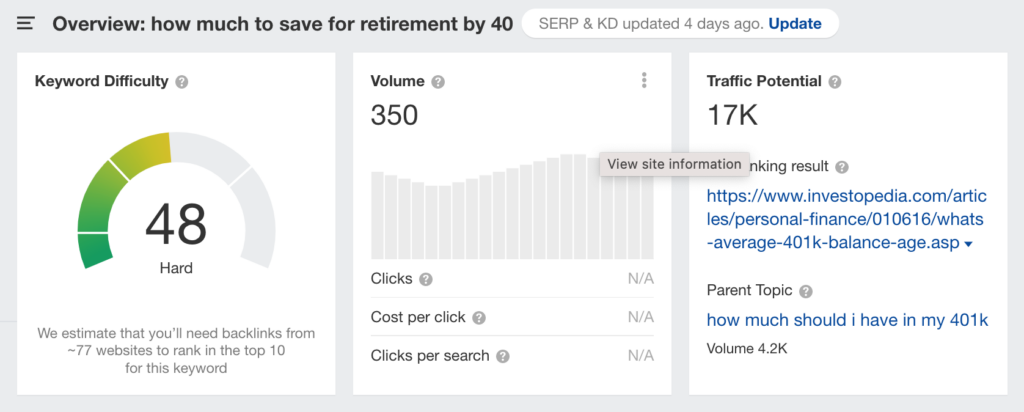
The reality is, there are thousands of ways that your target audience uses Google! If your website only has a homepage and some key service/product pages, you are missing tons of opportunities to rank for other relevant keywords in your industry.
Blog posts are a great way to answer the many different questions that users have about your products, your industry, or topics related to your niche.
The more blog posts you have that are relevant to your target audience’s searches, the more opportunities you have to rank.
Informative Blog Posts Display Industry Expertise
Google’s search raters use E.E.A.T. as a standard for quality content. That stands for experience, expertise, authoritativeness, and trustworthiness.

Long, informative blog posts tend to display these quality signals. They explore industry topics in-depth, are written by experienced creators, and help establish trust in your website as an authority in your industry.
Internal Links Between Blogs Help Google Discover New Pages
Adding lots of blog posts to your website gives you the opportunity to add internal links to your website.
A fundamental aspect of on-page SEO, internal links help Google discover new content on websites, understand a website’s hierarchy, and see how different pages interrelate.
Internal linking is a very powerful SEO strategy, but without the content on your website, you have nothing to link to! Blog posts are one of the many ways you can add content that has a purpose and brings true value to your target audience.
Blogs with Backlinks Show Google your Website is Trustworthy
One of Google’s primary factors for ranking web pages is backlinks. Backlinks show Google that your website is trustworthy because other webmasters on the internet are willing to link to it.
People often like to link to blog posts because they are informative, useful, and bring value to the user. Plus, earning backlinks through original content like blog posts is a safe and effective link-building strategy.
Blogs that rank on page one can earn tons of Organic Traffic
Blog posts that rank on page one can drive tons of organic traffic to a website. That means more website visitors see the products, services, or content that your business offers.
If your content marketing team does the work of keeping your blog posts updated with accurate information, your blog posts have the potential to rank on page 1 for years.
That’s free clicks and potential leads that you’ll earn, essentially, for free.
How Do Blog Posts Help Other Areas of Digital Marketing?
In addition to SEO, blogs also bring ancillary benefits to other areas of digital marketing.
Here are a few examples.
Blog Posts Give you Content to Promote on Social Media
If you are using social media to increase awareness of your business, blog posts can be used in Facebook posts, Instagram, and other platforms to drive interest in your content and thus traffic to your website.

A consistent stream of blog content means that your social media team will always have ways to include links back to your website in their social media strategy.
Email Marketing Campaigns Can Also Leverage Blog Content
Similar to social media content, the existing leads in your email database will also likely enjoy the informative blog articles your website publishes.
Linking and sharing links to blog posts in your email marketing campaigns can help drive back previous visitors who are already familiar with your brand.
Also, your email subscribers will see that your business is willing to share valuable resources with your customers.
For B2Bs, Blog Posts can Be Used in Outbound Sales Efforts
Informative blog posts that answer key questions about your products or services can also be utilized by your sales team when interacting with potential clients.
Not only can those blogs showcase your expertise and knowledge, but they can also be the difference maker in turning a lead into a customer.
Getting Started with Blog Content
So now that you know the many benefits of blog posts and how they help SEO, you’ll likely want to get started.
Here’s how to get started with blog SEO strategy and to see your SEO takeoff.
Do Some Keyword Research
Keyword research is the process of discovering terms and phrases users are relying on when searching for products and services like yours. SEO platforms like Search Atlas can help you do keyword research easily.
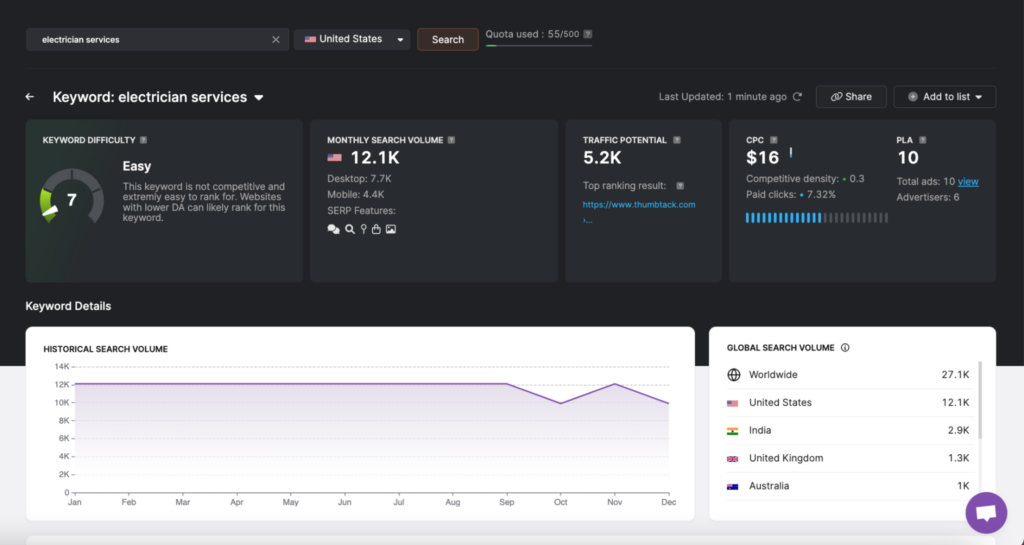
For blog posts, it’s usually best to target informational queries or common questions that users are asking.
When choosing keywords, there are a few important things to keep in mind.
- Search Volume: This is the number of users who are typing the keyword into Google every month. You want this number to be high enough to drive meaningful traffic to your website.
- Keyword Difficulty: This is an estimation of how difficult it is to rank for a particular keyword in the SERPs. For newer websites, targeting keywords with lower KD is usually a better strategy
- CPC: This is the price that users are paying to target this keyword in PPC campaigns. The higher the CPC, the more likely the traffic represents qualified audiences. High CPCs often represent high conversion potential.
In general, look for keywords with strong search volume, low keyword difficulty, and meaningful CPC.
Find Relevant Blog Topics
Once you find a keyword that meets the above criteria, you will need to develop a relevant blog post topic that can satisfy the search intent of that keyword.
There are a few ways you can go about doing this. First, look at the top-ranking content and see what Google is already promoting on page 1.
- How long is the content?
- Is it a blog post, product page, service page, or home page?
- What questions does it answer?
- Does it explore any subtopics or related questions?
These indicators can give you a good idea of what your blog post would need to look like in order to rank in the SERPs.
You can also use a tool like a blog ideas generator. These tools can help you move from keyword to blog post idea more quickly.
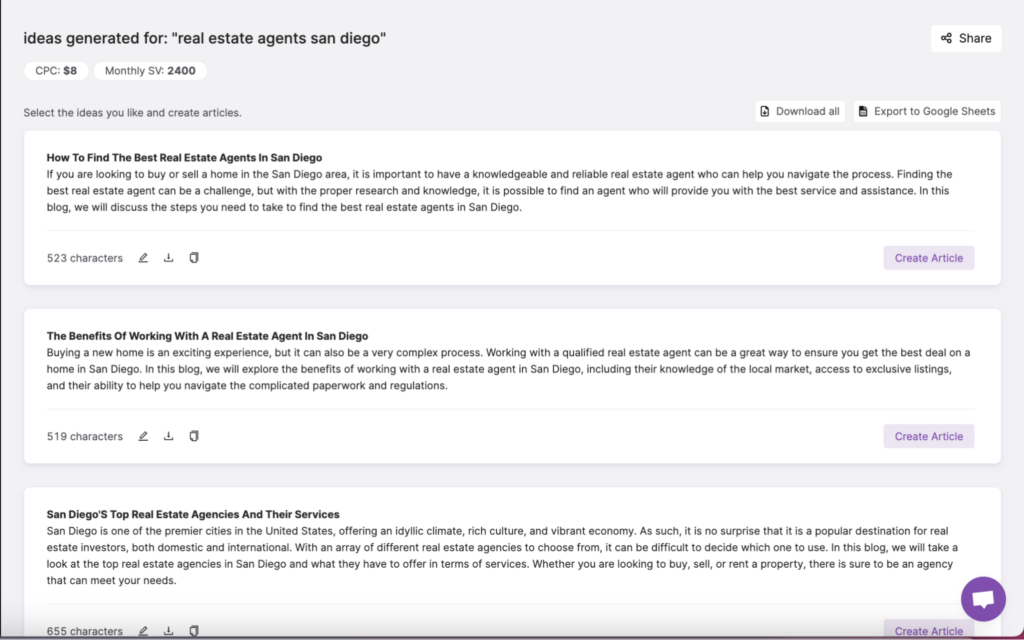
Make sure to add your brand voice and style. Then, you can move forward with drafting an original, engaging, informative piece of content.
Optimize your Blog Using On-Page SEO Best Practices
It’s also important to make sure you properly optimize your blog post using SEO best practices.
The most important of these practices to apply are the following:
- Keywords included in the url path, page title, and meta description
- H2s-H6s that provide easy navigation and structure
- Outlinks to informative, trustworthy sources
- Internal links to other relevant pages on your website
- Short paragraphs and sections
- Images that include proper file names and optimized alt text
- A compelling CTA that can convert traffic into leads or customers
Promote your Blog Using Other Digital Channels
Once your blog post is live on your website, it will likely take 1-2 weeks before Google indexes it. It may also take some time before Google starts ranking the post in the top pages of results.
So, make sure you promote your blog post through other digital channels like social media and email marketing.
If a user likes your content, they may choose to link to it. Those backlinks will help the SEO performance of your blog posts in the long term.
What Else Effects the SEO Performance of Blogs?
Creating high-quality blog posts is great for SEO and visibility, but there are some additional factors beyond the content that may impact whether or not your blog post ranks and drives traffic to your website.
The Competitiveness of a Keyword
As stated earlier, competitive keywords are more difficult for newer websites, or those with lower Domain Authority, to rank for.

If your target keyword is too competitive, or it gets more competitive over time, it will be more difficult for your website to rank.
The Speed and Performance of your Blog Posts
In addition to on-page and off-page factors, Google also considers the speed and load times of our blog posts in its ranking algorithm.
If your web pages take too long to load or don’t load completely for the user, it will likely have a negative impact on your SEO performance. You can use tools like Google’s PageSpeed Insights to ensure your blog are fast-loading.
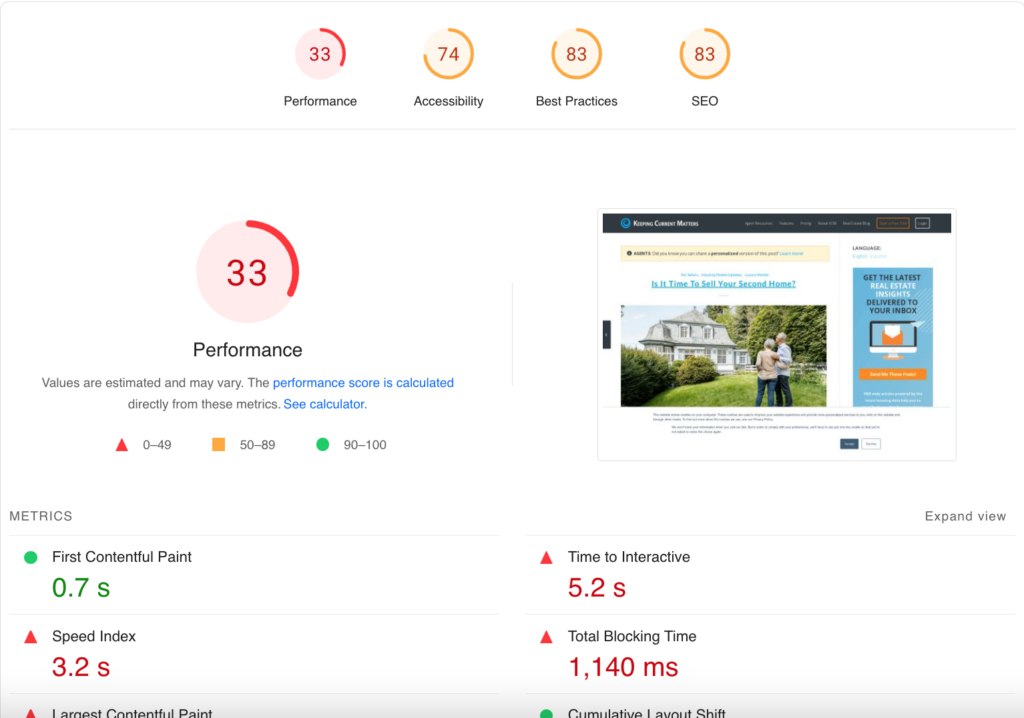
Make sure that you are optimizing your website for speed and performance so your pages pass Google’s Core Web Vitals.
Number and Quality of Backlinks
Blog posts with more backlinks are more likely to rank on page 1. If your blog post has no links pointing to it, it’s less likely to rank in search engines.
Over time, your blog posts can earn backlinks through digital PR, link building, social media promotion, and public relations.
So make sure you have someone on your team that is investing in these strategies, or if not, consider outsourcing to an SEO agency that can help you earn backlinks.
Final Thoughts on Blogs Helping SEO
So the resounding answer to the question, “Do Blogs help SEO?” is a resounding YES! Blogs are an amazing way to start getting more keyword rankings and organic traffic to your website.
If you need help developing and deploying a blog strategy, our team at Mighty Scribes has got you covered. Learn more about our blog writing services.



